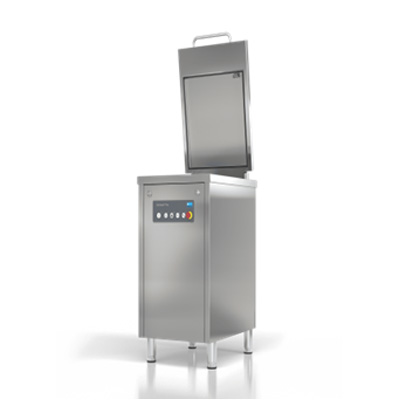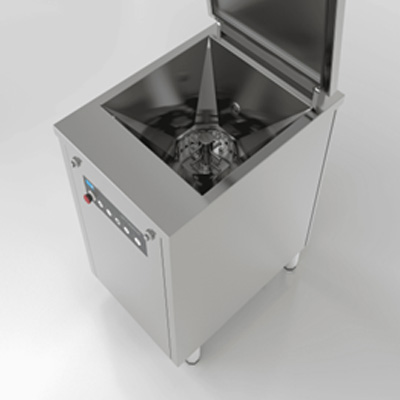2025 will see the Meiko UK launch of the compact biomaster ‘flex’ food waste recycling @ only 500 mm wide
The Meiko BioMaster FLEX food waste recycling system is just 500 mm wide and has 150 mm ground clearance for cleaning, making it ideal for any kitchen situation.
A FLEX system replaces floor bins and can be sited anywhere, next to the dishwasher or within tabling in the kitchen or prep area. The liquid food waste recycling system ensures that there are no open buckets or bins of food waste to move around, no unpleasant odours, and no flies or vermin.
BioMaster FLEX processes, using homogenisation, all typical food waste plus frying oil, coffee grounds, dead flowers and fats into a liquid slurry. This slurry is pumped to the BioTank, where it is collected and transported for biogas, usually every 4-6 weeks.
“FLEX provides the most sustainable, labour-efficient and futureproof recycling solution for the public sector,” says Meiko UK MD Paul Anderson.
“Featuring the same powerful homogenising motors as the larger BioMaster 4 hoppers, it deals with all typical food waste, including fats and oils, and it brings major cost benefits, including labour and collection cost savings.”
“Meiko BioMaster FLEX ensures the caterer retains clear ownership of the waste, which is essential to futureproofing the business. Homogenisation of waste gives the caterer the best negotiating position for cutting removal costs in the future, in addition to benefiting from the labour efficiencies and other cost savings.”
NOTES:
The most effective food waste management product ‘feature’ is homogenisation, the process whereby waste food is pulverised into a liquid slurry, or ‘soup’. The benefits for caterers include futureproofing:
- Food waste naturally accumulates in the dishwash, kitchen and food prep areas. The most labour-efficient method of removing food waste from catering premises is scrapping it into food waste hoppers, such as Meiko BioMaster, and storing the now homogenised liquid waste in sealed tanks for collection. All the alternatives to centralised food hoppers and homogenisation processes generally require extra labour in the form of handling the waste, emptying bins, and then moving the waste outside for storage and collection. Bins and storage areas also require regular sanitisation/cleaning, so additional labour and chemicals are needed. There are also other costs associated with black waste sacks and the repair of damage to walls and doors from transporting bins.
- Homogenisation reduces collection costs and boosts sustainability because liquid waste only needs to be collected every few weeks or monthly, depending on the size of the storage tank. Meiko BioMaster accepts all typical catering food waste and, most importantly, makes good use of the water content, which includes fats and sugars. Oil, fat, and grease are also valuable contributors to anaerobic digestion.
- Homogenisation and Meiko BioMaster retain clear ownership of the waste, which is essential to futureproofing the business. In addition to benefiting from labour and other cost savings, homogenisation also gives the caterer the best negotiating position for cutting removal costs in the future. The more energy your waste has, the more it is worth to the AD plant operator. The energy value of your waste may also prompt a move to investigate an in-house AD plant to heat the hot water or even heat a swimming pool!
The European AD market has already developed smaller-scale plant for hotels, universities, and hospitals. Small-scale systems provide cheap energy from kitchen food waste, but productivity multiplies when food waste is combined with other readily available waste streams such as garden waste and sewage.
Homogenised food waste is the ideal feedstock for AD plants, promising cheaper energy for the food service industry. The uniform nature of homogenised particles enables the maximum amount of energy to be extracted, a factor important for AD operators who are very conscious of the potential extra labour and time involved in processing raw, composted or dried waste.





